A good night’s sleep is the foundation of mental and physical health. Not sleeping well for even one night can throw you off your goals and make it hard to accomplish much of anything.
Unfortunately, up to 40% of adults struggle with sleep disorders and disturbances, likely including many of your clients. There are over 80 different types of sleep disorders, such as insomnia, restless leg syndrome, and sleep apnea, that can make it difficult to get the rest required to accomplish other health goals.
Food and sleep go hand in hand. So, as a health practitioner, you can help your clients incorporate dietary changes to improve their health and get a more restful night. In this article, we will cover some key items to help you create a client's meal plan for better sleep:
- Nutrients and foods to include
- Foods to avoid
- Lifestyle considerations
Key Nutrients & Foods in Meal Planning for Better Sleep
A 2024 systematic review found a correlation between following a Mediterranean diet and quality sleep. This eating pattern is characterized by a high intake of fruits, vegetables, whole grains, healthy fats, and seafood while limiting red meat and dairy. Adherence to this way of eating has been consistently associated with improved sleep quality and less daytime sleepiness or insomnia.
But what is it about the Mediterranean diet that helps with sleep? This healthy diet pattern can help improve brain health and lower inflammation, which can impact sleep quality.
Another factor may be the types of foods the Mediterranean diet includes, which have well-researched positive effects on sleep. Here are some of the foods that can be beneficial:
Melatonin-Boosting Foods
Certain foods help support the healthy production of melatonin, a hormone that increases at night to make us sleepy. Many fruits, nuts, and proteins are natural sources of melatonin or help support normal melatonin production.
Some of these with research-backed benefits include tart cherries, nuts like almonds and walnuts, eggs, fish, mushrooms, cereals, and legumes.
Tip: Using That Clean Life, you can filter for recipes that follow the Mediterranean eating pattern and include ingredients like cherries.
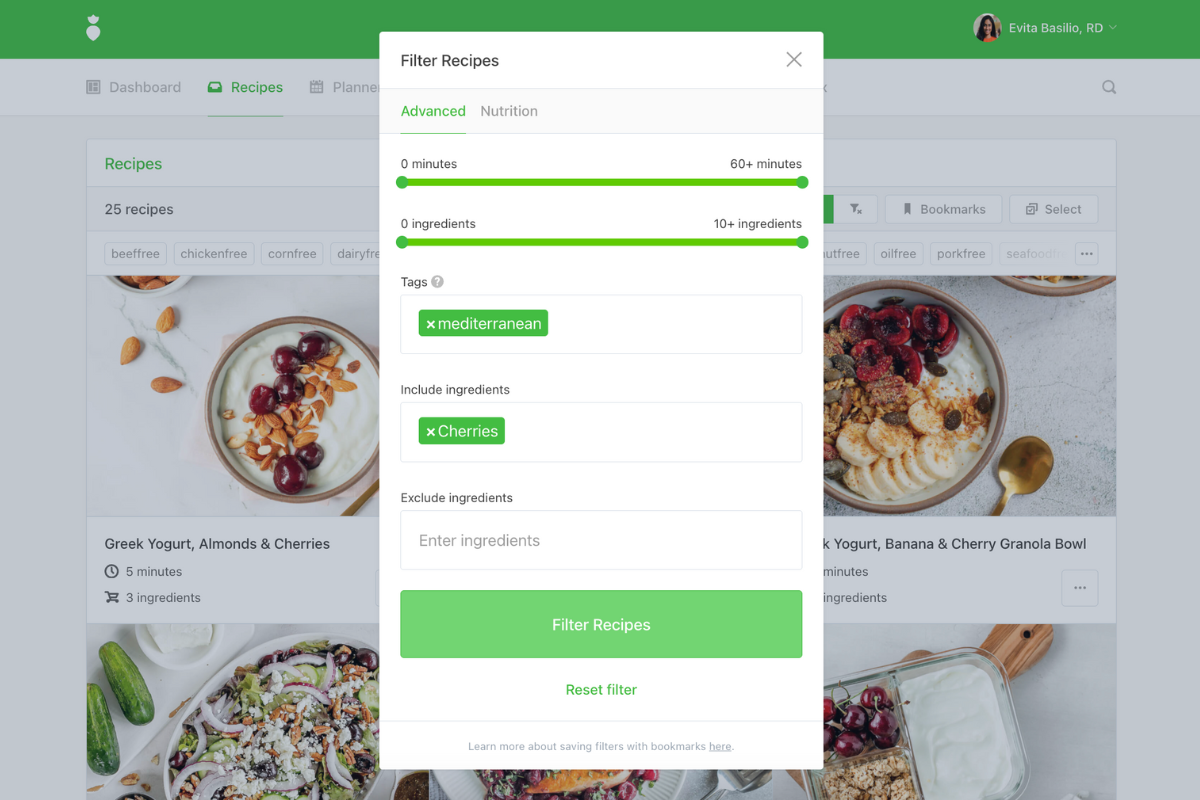
Serotonin and Tryptophan
Tryptophan is an amino acid found in protein used to make neurotransmitters and hormones in the brain, like serotonin and melatonin. It can help you feel sleepy and relaxed. Serotonin also plays a role in mood and healthy sleep. Increasing foods high in tryptophan can help boost serotonin levels, supporting better sleep health.
Foods high in tryptophan or supporting serotonin levels include protein-rich foods, especially turkey, kiwi, egg yolks, seeds such as pumpkin, sesame, chia, dark chocolate, and fermented foods.
Tip: Kickstart creating your meal plan with That Clean Life’s ready-to-use Sleep Support Program and Plant-Based Sleep Support Program. Each plan includes a 7-day meal plan, an itemized shopping list, appropriate recipes, a prep guide, and evidence. The programs are fully customizable based on your client’s needs and preferences.
Omega-3 fatty acids
Omega-3 fatty acids, particularly EPA and DHA, found in fatty fish, can help improve sleep by lowering inflammation, supporting healthy serotonin levels, and regulating circadian rhythms. Fatty fish are one of the few food sources of vitamin D, which can also improve sleep patterns.
These healthy fats can be found in various plant and animal-based foods, including wild-caught salmon, mackerel, sardines, anchovies, oysters, ground flaxseed, chia seeds, walnuts, and soybeans.
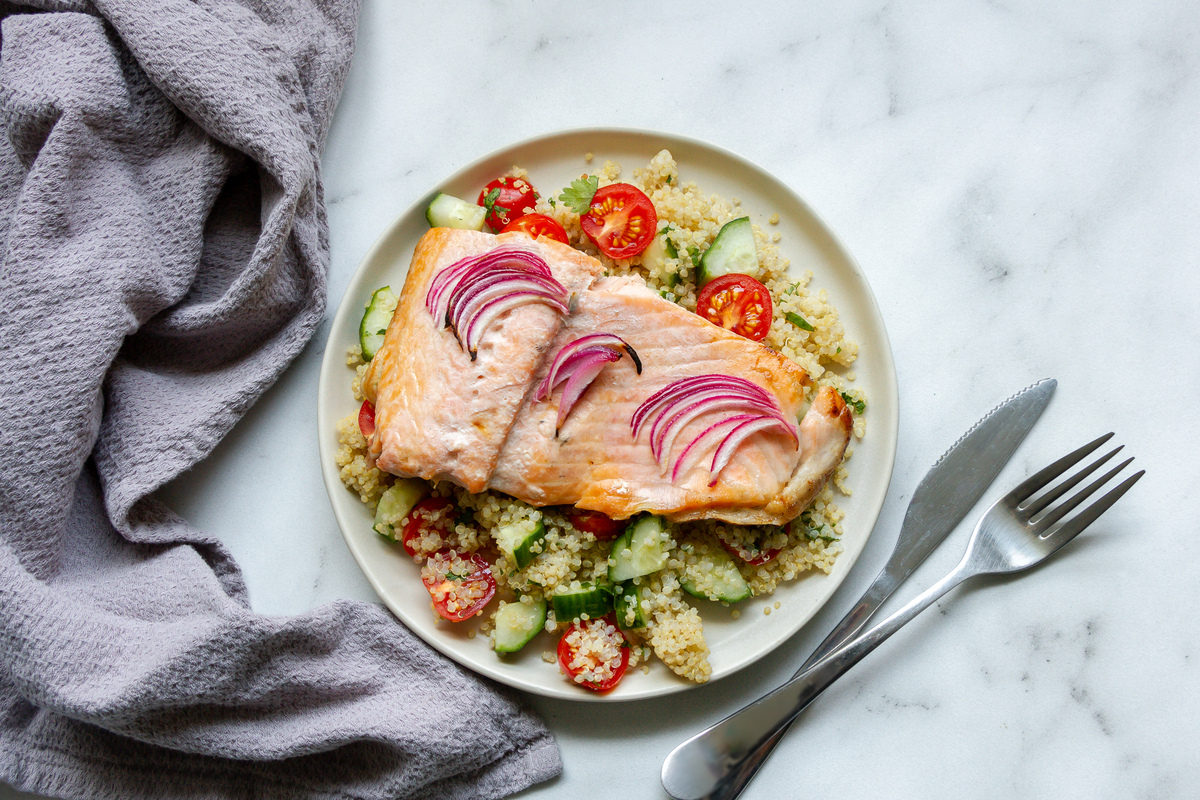
Dairy
You may have been given a cup of warm milk as a child to help you sleep. There is actual evidence to support milk as a sleep-boosting food. Dairy contains nutrients that help improve sleep, like magnesium, tryptophan, calcium, vitamin D, and melatonin. A calcium or magnesium deficiency has also been shown to impact healthy sleep patterns, so getting enough is key, and dairy can help reach those goals.
To get the sleep benefits of dairy, you don’t need to just drink milk before bed. Greek yogurt and cottage cheese work as well. For an additional anti-inflammatory benefit, consider a Golden Latte before bed, made by combining boiled milk with turmeric.
Chamomile Tea
Another beverage option for better sleep is a warm herbal tea, like chamomile. Chamomile is a source of anti-inflammatory flavones and an antioxidant called apigenin that can help reduce insomnia. Other herbal teas or “sleepy time” blends can also help promote sleep.
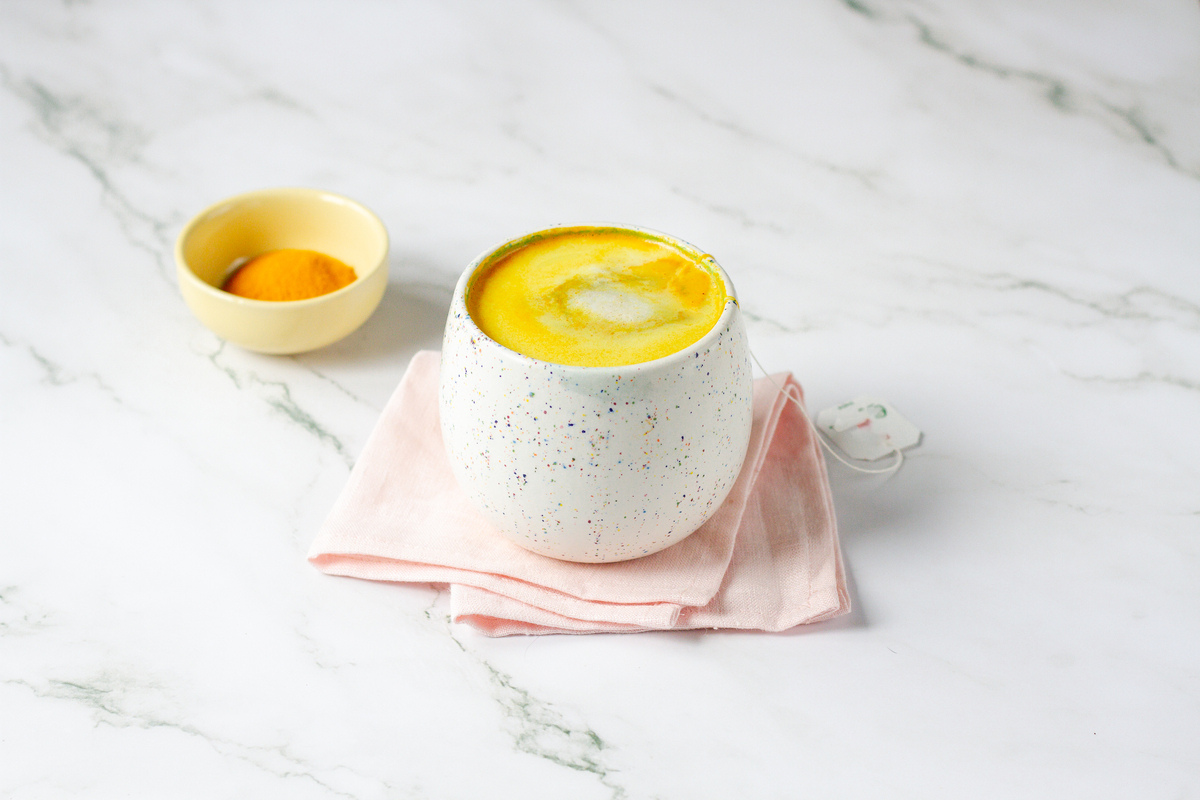
Nuts
Almonds, cashews, walnuts, and other nuts are good sources of magnesium and melatonin that can help support healthy sleep. Walnuts are also a source of plant-based omega-3s, which can help reduce inflammation and improve brain health.
Foods Rich in B Vitamins
While we typically think of B vitamins as being involved in energy metabolism, they have also been found to support healthy sleep. Specifically, vitamin B12 helps regulate circadian rhythm, vitamin B6 improves mood and reduces insomnia, and B-complex can improve restless legs.
Rice, beans, yogurt, cottage cheese, chicken breast, and chickpeas are good sources of B vitamins.
Tip: Using That Clean Life, you can filter for nutrients like calcium, magnesium, vitamin B12, and B6.
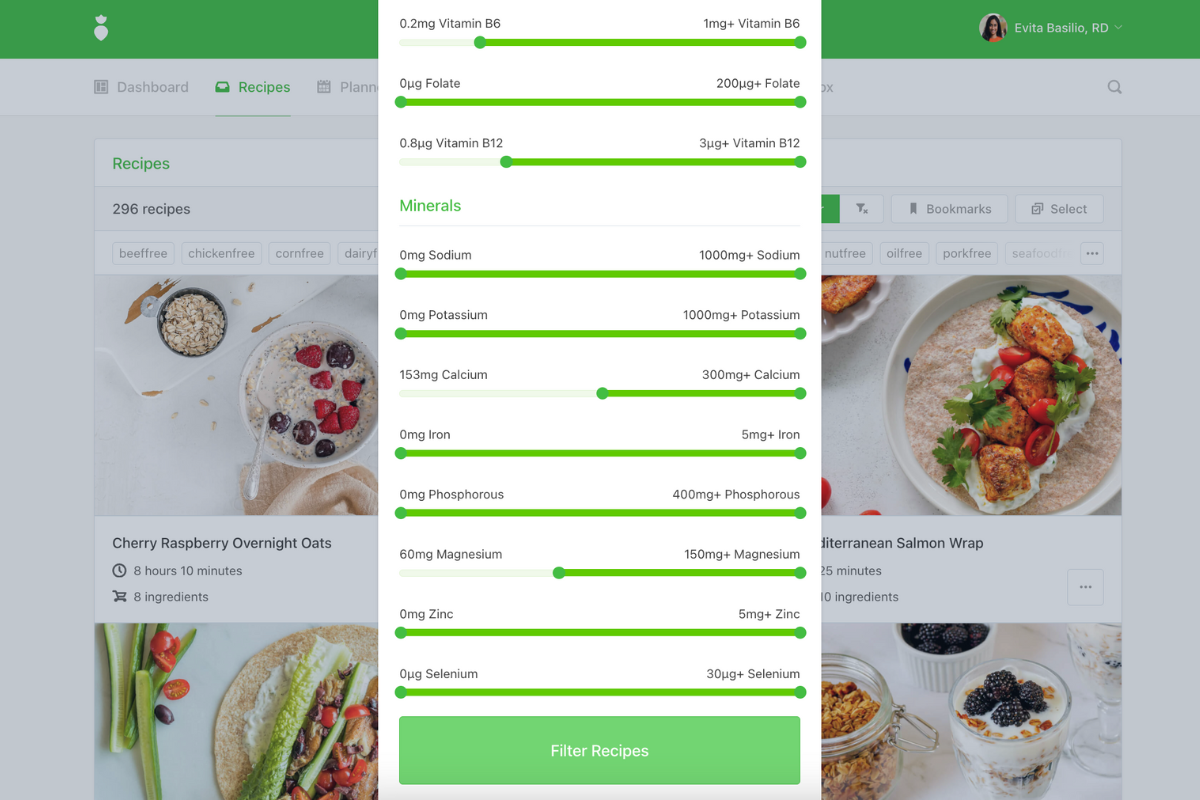
Foods High In Fiber
Research has found that adequate fiber intake is correlated with normal sleep patterns. Specifically, NHANES data discovered that those with the highest fiber intake had the most “normal” sleep patterns, whereas those who did not eat enough fiber either slept too much or not enough.
Fiber is found in plant-based foods such as whole grains, fruits, vegetables, beans, legumes, nuts, and seeds.
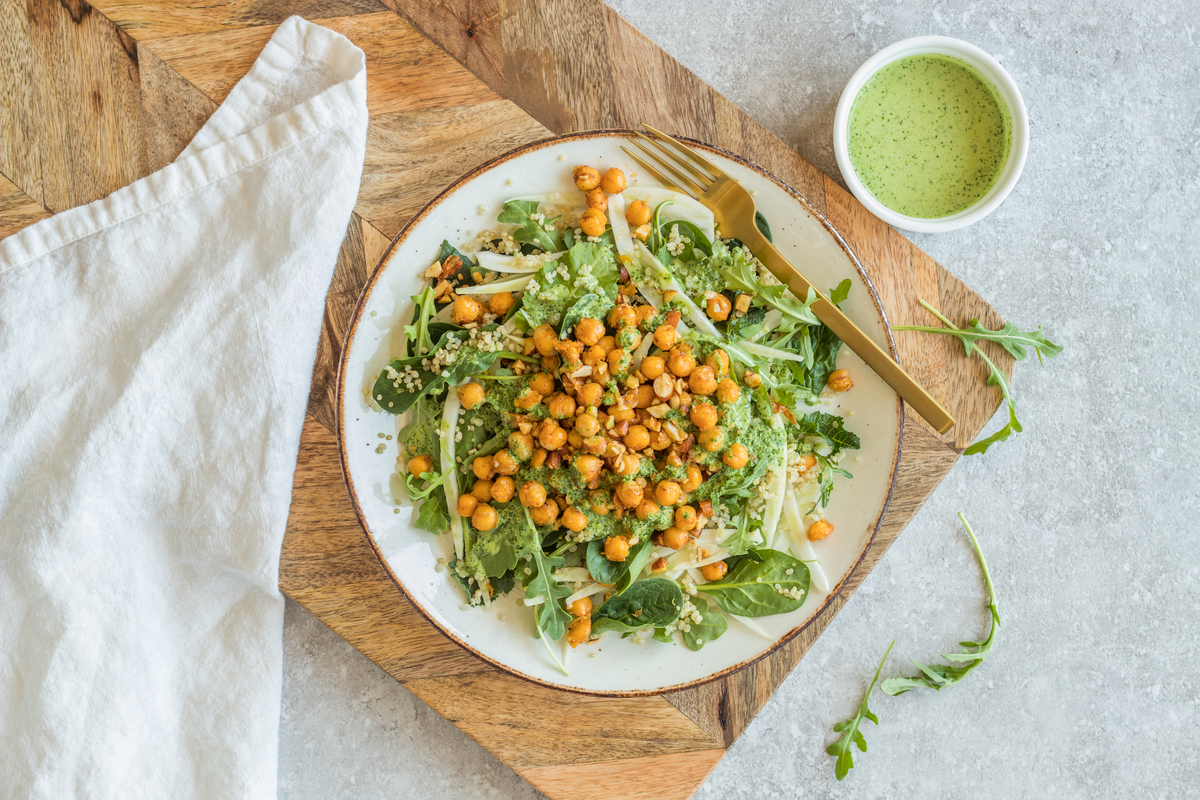
Foods to Avoid
While certain foods can support healthy sleep, food that causes reflux, gas, or bloating can disrupt sleep patterns. These include spicy foods, chocolate, peppermint, fried or high-fat foods.
Large, high-fat meals can also take a long time to digest, leaving a lingering feeling of fullness and bloating, making it hard to fall asleep. A higher-fat meal should be eaten at least 2-3 hours before bed to give the body the time to digest the food.
Foods and drinks with stimulating effects, such as coffee, tea, soda, or energy drinks, can also keep you tossing and turning all night. Caffeine should be consumed before noon for a good night’s sleep, particularly for those sensitive to its effects.
Tip: Using That Clean Life, you can filter for recipes that exclude known food triggers for your client.
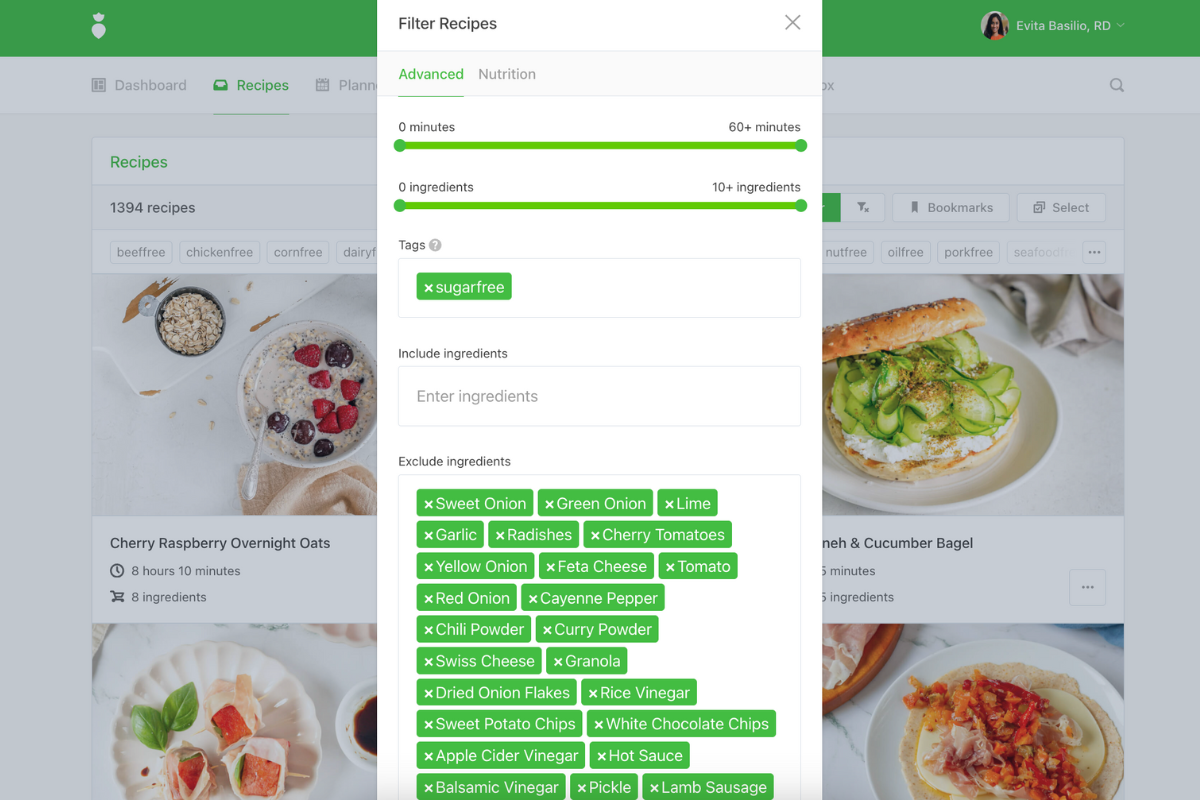
Lifestyle Considerations for Better Sleep Health
Lifestyle choices can impact sleep patterns as much as food and should be considered when improving sleep quality. We have already discussed stimulants like caffeine and how they should be avoided several hours before bed. Nicotine also has stimulating effects that can impact sleep as well.
Many people believe that alcohol helps them sleep, but while alcohol can help you fall asleep initially, alcohol can trigger middle-of-the-night wake-ups or prevent deep sleep. If your clients drink alcohol, you can advise having their last drink at least four hours before bed to allow the alcohol to get out of their system.
Other lifestyle changes that can improve sleep include:
- Regular exercise, at least 150 minutes per week
- Avoiding screens, like TV and phones, before bed
- Having a sleep routine, going to bed and waking up at the same time
- Managing stress through deep breathing, meditation, and similar practices
Learn more about Creating a Future-Proof Practice with Integrated Behavioral Health Services.
Sleep is Foundational for Your Client's Health
Sleep disruptions can impact your client's adherence to other healthy routines and goals. Including sleep-promoting foods daily and implementing lifestyle changes can help improve sleep patterns, which can trickle down to all areas of life.
That Clean Life’s Sleep Support Program and Plant-Based Sleep Support Program can help you support your clients in getting a better night’s sleep. These are pre-designed programs with meal plans, shopping lists, and more that include all the sleep-promoting foods your clients need to feel their best.
Ready to create your sleep support plan? Use our templates to jumpstart the client experience with a comprehensive, evidence-based meal plan.
If you are not yet a member of That Clean Life, watch our demo here to see how it works!

